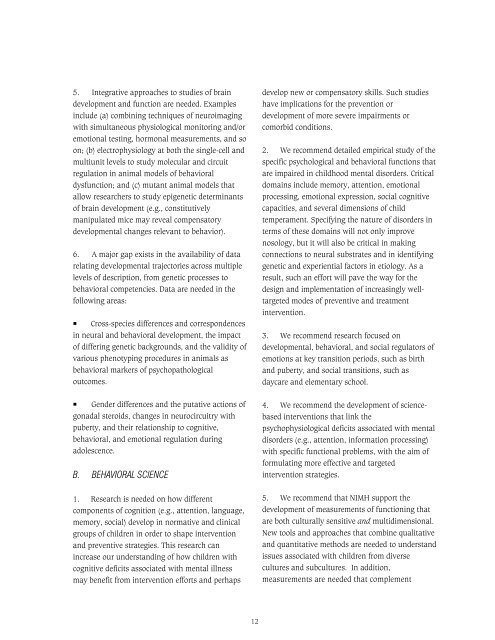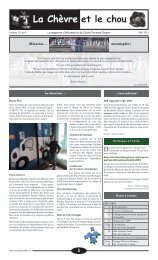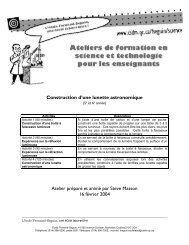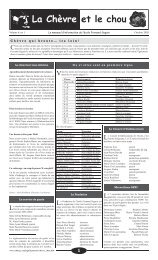Research on Child and Adolescent Mental Health
Research on Child and Adolescent Mental Health
Research on Child and Adolescent Mental Health
Create successful ePaper yourself
Turn your PDF publications into a flip-book with our unique Google optimized e-Paper software.
5. Integrative approaches to studies of brain<br />
development <strong>and</strong> functi<strong>on</strong> are needed. Examples<br />
include (a) combining techniques of neuroimaging<br />
with simultaneous physiological m<strong>on</strong>itoring <strong>and</strong>/or<br />
emoti<strong>on</strong>al testing, horm<strong>on</strong>al measurements, <strong>and</strong> so<br />
<strong>on</strong>; (b) electrophysiology at both the single-cell <strong>and</strong><br />
multiunit levels to study molecular <strong>and</strong> circuit<br />
regulati<strong>on</strong> in animal models of behavioral<br />
dysfuncti<strong>on</strong>; <strong>and</strong> (c) mutant animal models that<br />
allow researchers to study epigenetic determinants<br />
of brain development (e.g., c<strong>on</strong>stitutively<br />
manipulated mice may reveal compensatory<br />
developmental changes relevant to behavior).<br />
6. A major gap exists in the availability of data<br />
relating developmental trajectories across multiple<br />
levels of descripti<strong>on</strong>, from genetic processes to<br />
behavioral competencies. Data are needed in the<br />
following areas:<br />
P Cross-species differences <strong>and</strong> corresp<strong>on</strong>dences<br />
in neural <strong>and</strong> behavioral development, the impact<br />
of differing genetic backgrounds, <strong>and</strong> the validity of<br />
various phenotyping procedures in animals as<br />
behavioral markers of psychopathological<br />
outcomes.<br />
develop new or compensatory skills. Such studies<br />
have implicati<strong>on</strong>s for the preventi<strong>on</strong> or<br />
development of more severe impairments or<br />
comorbid c<strong>on</strong>diti<strong>on</strong>s.<br />
2. We recommend detailed empirical study of the<br />
specific psychological <strong>and</strong> behavioral functi<strong>on</strong>s that<br />
are impaired in childhood mental disorders. Critical<br />
domains include memory, attenti<strong>on</strong>, emoti<strong>on</strong>al<br />
processing, emoti<strong>on</strong>al expressi<strong>on</strong>, social cognitive<br />
capacities, <strong>and</strong> several dimensi<strong>on</strong>s of child<br />
temperament. Specifying the nature of disorders in<br />
terms of these domains will not <strong>on</strong>ly improve<br />
nosology, but it will also be critical in making<br />
c<strong>on</strong>necti<strong>on</strong>s to neural substrates <strong>and</strong> in identifying<br />
genetic <strong>and</strong> experiential factors in etiology. As a<br />
result, such an effort will pave the way for the<br />
design <strong>and</strong> implementati<strong>on</strong> of increasingly welltargeted<br />
modes of preventive <strong>and</strong> treatment<br />
interventi<strong>on</strong>.<br />
3. We recommend research focused <strong>on</strong><br />
developmental, behavioral, <strong>and</strong> social regulators of<br />
emoti<strong>on</strong>s at key transiti<strong>on</strong> periods, such as birth<br />
<strong>and</strong> puberty, <strong>and</strong> social transiti<strong>on</strong>s, such as<br />
daycare <strong>and</strong> elementary school.<br />
P Gender differences <strong>and</strong> the putative acti<strong>on</strong>s of<br />
g<strong>on</strong>adal steroids, changes in neurocircuitry with<br />
puberty, <strong>and</strong> their relati<strong>on</strong>ship to cognitive,<br />
behavioral, <strong>and</strong> emoti<strong>on</strong>al regulati<strong>on</strong> during<br />
adolescence.<br />
B. BEHAVIORAL SCIENCE<br />
4. We recommend the development of sciencebased<br />
interventi<strong>on</strong>s that link the<br />
psychophysiological deficits associated with mental<br />
disorders (e.g., attenti<strong>on</strong>, informati<strong>on</strong> processing)<br />
with specific functi<strong>on</strong>al problems, with the aim of<br />
formulating more effective <strong>and</strong> targeted<br />
interventi<strong>on</strong> strategies.<br />
1. <str<strong>on</strong>g>Research</str<strong>on</strong>g> is needed <strong>on</strong> how different<br />
comp<strong>on</strong>ents of cogniti<strong>on</strong> (e.g., attenti<strong>on</strong>, language,<br />
memory, social) develop in normative <strong>and</strong> clinical<br />
groups of children in order to shape interventi<strong>on</strong><br />
<strong>and</strong> preventive strategies. This research can<br />
increase our underst<strong>and</strong>ing of how children with<br />
cognitive deficits associated with mental illness<br />
may benefit from interventi<strong>on</strong> efforts <strong>and</strong> perhaps<br />
5. We recommend that NIMH support the<br />
development of measurements of functi<strong>on</strong>ing that<br />
are both culturally sensitive <strong>and</strong> multidimensi<strong>on</strong>al.<br />
New tools <strong>and</strong> approaches that combine qualitative<br />
<strong>and</strong> quantitative methods are needed to underst<strong>and</strong><br />
issues associated with children from diverse<br />
cultures <strong>and</strong> subcultures. In additi<strong>on</strong>,<br />
measurements are needed that complement<br />
12

















